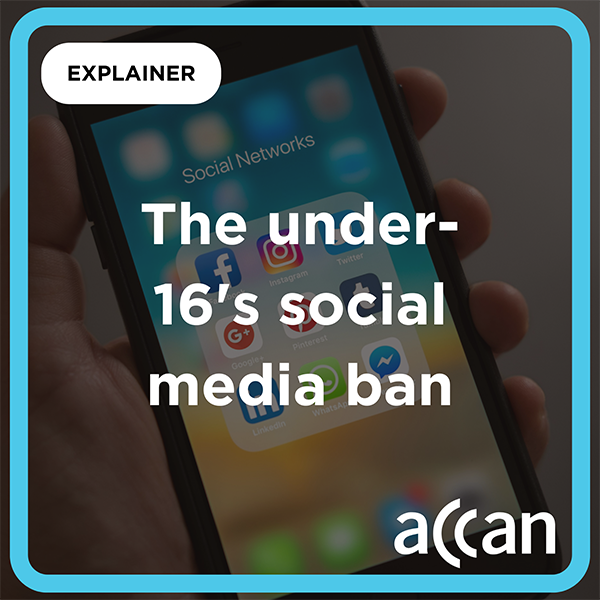- Details
National communications consumer body ACCAN is encouraging consumers to Stop, Check, and Protect to remain scam safe this Black Friday and Christmas sales season.
With nearly $7 billion expected to be spent in the four-day period between Black Friday and Cyber Monday, criminals will be intensifying efforts to steal money from unsuspecting online shoppers.
Read more: Great discounts, good deals and deceptive scams abound this sales season
- Details
The opinion piece below was written by ACCAN CEO Carol Bennett for the Sun Herald. It was originally published on 28 November 2024.
Imposing a ban on social media for those under 16 years of age won’t be simple and it certainly won’t be a silver bullet. But it is the right thing to do.
The government’s proposed ban has polarised policymakers, the media and experts. It has also become a 'play thing’ of the politicking that is now reaching a new levels as we approach an election in early 2025.
Read more: Four reasons for the social media youth ban
Write comment (0 Comments)- Details
 Background
Background
The government has proposed banning Australian children under the age of 16 from using social media platforms. If passed, children would no longer be able to use platforms such as:
- X (formerly Twitter)
- TikTok
- Snapchat
Read more: The under-16’s social media ban
Write comment (0 Comments)- Details
ACCAN recently submitted to the Senate Standing Committees on Environment and Communications' inquiry into the Online Safety Amendment (Social Media Minimum Age) Bill 2024 [Provisions].
ACCAN welcomes the Government's commitment to safeguarding children's online safety. ACCAN advocates for a systems-first approach to improve online safety for all social media users.
ACCAN recommends the Government:
- Amend the Online Safety Act 2021 (Cth) to directly regulate social media services to comply with safety by design measures.
- Prioritise strong privacy measures to protect users from targeted marketing and the exploitation of their data.
Read more: Online Safety Amendment (Social Media Minimum Age) Bill 2024 [Provisions]
- Details
ACCAN has welcomed the transparency of data released this week by the Telecommunications Industry Ombudsman which highlights a small year-on-year jump in complaints as well as the telling figure of 30% of consumers not being able to reach a resolution after it is referred to their telco.
ACCAN CEO Carol Bennett said, “consumers rely on mobile, internet and landline services for essential connectivity and the transparency provided by this report highlights much room for improvement in the management of consumer telco complaints.”
- Details
 The opinion piece below was written by ACCAN CEO Carol Bennett for the Canberra Times. It was originally published on 13 November 2024.
The opinion piece below was written by ACCAN CEO Carol Bennett for the Canberra Times. It was originally published on 13 November 2024.
Australian consumers can be forgiven for feeling angry and disgusted at the behaviour of Australia's second-largest telco - Optus - for mis-selling products to vulnerable consumers.
Australia's consumer watchdog has launched court action alleging that Optus rorted consumers by pushing the sale of products they did not want, need or understand, and pursued many for debts resulting from these sales.
Read more: Internet and phone access can be a matter of life and death
Write comment (0 Comments)- Details
ACCAN has today welcomed the decisive action by the Australian Communications and Media Authority (ACMA) in holding Optus to account and issuing a $12 million fine for risking the welfare of hundreds of consumers during the widespread outage of November 2023. This latest fine signals the need for the company and its new CEO, Steven Rue, to put consumers first in its business practices.
The ACMA has found that 2145 people attempted to reach Triple Zero services during the outage, which it described as ‘preventable’. Optus failed to follow up on the welfare of nearly 370 customers once the outage was resolved, as they are required to do.
ACCAN CEO Carol Bennett said, “We know that new rules which set standards for telco practices during outages are soon to come into effect. Thankfully, this may serve to prevent this occurring in future.”
Read more: Optus cops major Triple Zero fine, must now put consumers first
- Details
ACCAN recently submitted to the Productivity Commissions’ inquiry into the Opportunities in the Circular Economy. ACCAN’s submission sets out initiatives that would ease cost of living pressures on consumers and reduce the environmental impact of the communications sector.
ACCAN’s submission recommends the Government:
- Reform national policy settings to facilitate a competitive independent repair sector and develop a national repairability labelling scheme for consumer products.
- Legislate a Right to Repair following the recommendations of the Right to Repair inquiry report and taking into account the European Union’s Right to Repair Directive.
- Develop an information standard for refurbished devices to facilitate consumers effectively comparing the quality of refurbished internet devices.
- Details
The peak body for communications consumers, the Australian Communications Consumer Action Network (ACCAN) today described the alleged actions of Optus in mis selling products to vulnerable consumers as ‘unconscionable’ and called on the Federal Minister for Communications Michelle Rowland to directly regulate the industry to end this pattern of behaviour by telcos.
The ACCC has today alleged disgraceful conduct by Optus – Australia’s second largest telco. Court action has been launched which accuses Optus of taking advantage of consumers, predominately First Nations, regional consumers, consumers with a disability, and low-income consumers.
Read more: Disgraceful Optus conduct must spur fundamental change in telco sector
- Details
ACCAN recently submitted to the Australian Communications and Media Authority (ACMA) regarding the proposed Telecommunications (Customer Communications for Outages) Industry Standard 2024 (the standard). ACCAN welcomes the development of an industry standard for communications, having called for stronger action in this field following the Optus Outage on 8 November 2023.
- Details
ACCAN recently submitted to the Parliamentary Joint Committee on Intelligence and Security (the Joint Committee) on the Cyber Security Legislative Package 2024 (the Legislative Package). ACCAN’s comments on the Legislative Package are restricted to the Cyber Security Bill 2024 (The Bill).
In this submission, ACCAN provides the Joint Committee with recommendations to improve the cybersecurity of consumers using connected devices, including Internet of Things devices, by improving the enforcement structures established under the Bill relating to the security standards of connected devices.
ACCAN recommends that:
- Details
ACCAN recently commented on the Department of Industry, Science and Resources’ proposals paper for introducing mandatory guardrails for AI in high-risk settings (the paper).
Artificial Intelligence (AI) is a rapidly evolving and broad technology that, with the right regulatory settings, can provide material benefits for consumers. AI can offer tailored services for consumers and potentially drive efficiencies in business, lowering the cost for consumers. However, as the paper notes, AI also carries risks of consumer harm through discrimination and data breaches.
Read more: Proposals Paper for Introducing Mandatory Guardrails for AI in High-Risk Settings
